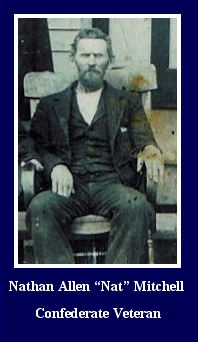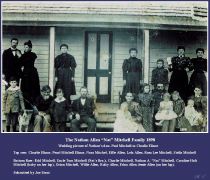Confederate Veteran
![]()
1898 Weakley County, Tennessee
![]()
1898 Weakley County, Tennessee
 |
![]()
|
In 1845 my father and mother, James A. and Lucinda Petty Mitchell made the trek from Virginia to Carroll County Tennessee where they bought a 75 acre farm. This farm was in the community of Christmasville right on the Weakley County line. With them came all 7 of my brothers and sisters ranging in age from 2 to 21 years old. At that time my father was 53 and my mother was 40.The next year I was born and am the only one in my family born in Tennessee.They named me Nathan Allen Mitchell but I have always been called Nat. As a boy growing up I worked on the farm doing all kinds of farm work from plowing, harvesting, cleaning out stables and slopping hogs. My education was limited but I did not take full advantage of the opportunities that were available. Our home was a log house with 4 rooms. My father did in common what the rest of us did but he was too old to work when I was a young man. My mother did all manner of house work, cooking, spinning, weaving, etc. She also did work in the field. When the Southern states seceded, the Northern States began their attempt to invade and to dominate the South, and the Western Division was one of the primary targets. The major rivers of the Tennessee and Mississippi were the major means of commerce travel. My father owned 6 slaves that he
brought here
with the family when they came
Many of the young men of our community enlisted in the Confederate army including members of my family. At the age of 17, I enlisted in the Confederate Army in March 1862 in the town of Trezevant, Tennessee, in Co. C of the 55th Tennessee Regiment. Alexander J. Brown was Colonel. Robert Hurt was Lieutenant, Joe Mcdonald, Captain Ben Hallman, Captain. Our company was first sent to Union City Tennessee and from there we proceeded to Number 10 Island on the Mississippi River near New Madrid Missouri. On March 17, our Regiment was placed on the parapet, in support of Captain Rucker's Battery. He reported "some men from Brown's Regiment had relieved Captain Rucker's exhausted men, and served the guns bravely, manfully and intelligently. They had done good and efficient service on that day." When Brigadier General W.W. Mackall arrived on April 1st he reported" Colonel Brown's 55th Tennessee with but few arms. Those in the regiment are of different kinds, but pretty good. The ironclad Carondelet on the night of April 4 passed our Island No. 10 batteries and anchored off New Madrid. Pittsburgh followed on the night of April 6. The ironclads helped to overwhelm our batteries and guns. This enabled Pope's men to cross the river and block our escape route. Our commanders had no choice but to surrender Island No. 10 on April 8. I was sent north with all of our brigade to a Yankee prison camp. After spending almost six months in terrible conditions we were released on parole at Vicksburg, on September 20, 1862, in a prisoner exchange. In the meantime the regiment had reorganized at Jackson, Mississippi. We reported for duty at Meridian, Mississippi and rejoined our unit. On February 15, 1864 the Congress of the Confederacy passed a resolution of thanks to the 46th/55th for "patriotism displayed in unanimously reenlisting for the war." I was in the entire Georgia campaign and was wounded on the 28th of July 1864 in the battle of Ezra Church. This battle was also called The Battle of Poor House Georgia. I was sent to the hospital at Forsythe Ga. I got a sixty day furlough that I spent with my uncle at Clayton Alabama. I returned to the army at Tuscumbia, Alabama from thence on to the great campaign in Nashville Tennessee. I shall not undertake to mention the many hardships to which I was exposed but endured all. At the end of the war I was discharged at Greensboro, North Carolina with Johnsons army on April 26, 1865. Three years had passed, when as a boy I became a soldier, though it seemed a lifetime. It did not take me long to become a man. I now began the long trek home, at last, as a man that had experienced some of the worst of inhumanity to man. We marched over to Greenville, Tennessee and took train there that went through Chattanooga to Nashville and down to Johnsonville on the Tennessee River. I happened to have the good luck that a friend was there that was an oarsman took me and others across the Tennessee river. Home was only 50 miles away. Arriving home I realized how the devastation of war had also affected our little rural community. It would be many years before things returned to normal. Four years later on April 14, 1869 Caroline (Callie) Holt and I were married. To our union there were 4 boys and 6 girls born that lived to maturity. We had 3 other children that died in infancy.
|
Click on photo below to see BIG picture of Mitchell Family
 |
|
I shall never forget that day
On that North Carolina hill
The man in blue across from me
He would be going to his home
I've always tried to do my
best
I'm now on my way to that land
Written and submitted by Joe
Stout
|
![]()
BACK
to Civil War Page
![]()
RETURN to Weakley County Home Page
webpage Design by MaryCarol